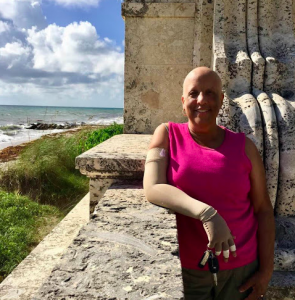Caregivers Should Connect to Breast Cancer Awareness
Written by |

October is Breast Cancer Awareness Month, and of course, its purpose is to create buzz and mindfulness about the disease.
In the United States, breast cancer is the second most common type of cancer among women. Skin cancer is No. 1, according to the American Cancer Society.
Like Alzheimer’s disease, early detection is linked to survival rate. Breast cancer was a death sentence not too many years ago, but in recent years, the survival rate has increased. The sooner a woman is diagnosed and begins treatment, the better her chances are for surviving breast cancer.
Caregivers should take breast cancer awareness seriously
It’s not odd to talk about breast cancer in a column designated for Alzheimer’s disease, and here’s why: The majority of caregivers in the United States are women, which indicates that many caregivers face the possibility of developing breast cancer. Nearly 300,000 women will be diagnosed with invasive breast cancer this year, and more than 42,000 will die from the disease.
A smaller number of men will be diagnosed with the disease: an estimated 2,620 in the U.S., of which 520 will pass away.
While it’s true that more seniors die from Alzheimer’s disease than the combined deaths of people with breast and prostate cancer, breast cancer is still a threat to caregivers, simply due to the number of women who provide care.
Along the same lines, caregivers are also at risk for Alzheimer’s disease, as they fall within the age categories when Alzheimer’s is usually diagnosed. The majority of caregivers happen to be seniors, caring for people their same age or older. On average, caregivers are 49.2 years of age, with 34% being 65 or older and 48% being between 18 and 49. The age of many caregivers is also the average age at which the American Cancer Society recommends mammograms.
Don’t overlook your health
Caregivers tend to overlook their own needs, which is detrimental to their health and ultimately to the person for whom care is provided. If this sounds familiar, it’s because we’ve stressed the issue in multiple columns. Early diagnosis is the key to your good health, in regards to both Alzheimer’s disease and breast cancer.
Failing to schedule annual breast exams and mammograms could prove deadly. Make an appointment with your healthcare provider or call your local chapter of the American Cancer Society for information on where to have a mammogram. If cost is an issue, search for low-cost options during the month of October. Some clinics and healthcare providers are offering the test for free.
Be proactive
If you’re a woman, understand that you have an average risk of developing breast cancer, simply because you’re female. The American Cancer Society suggests that those of us at average risk begin having mammograms at 40 years of age. Mammograms correctly detect breast cancer in 78% of cases and are accurate 83% of the time in women over 50.
Self-examination is also important and caregivers should be proactive in self-checking and also scheduling annual examinations and mammograms. A mammogram often detects breast cancer before the tumor is large enough to be felt during self-examination.
For your good health
As a primary caregiver, I am keenly aware of the constraints that prohibit you from paying attention to your own health. However, as a breast cancer survivor, I am also intensely aware of the importance of early diagnosis. Please do not ignore your health. Do everything you can to stay healthy. Maybe you’re afraid to have a mammogram for the same reasons many people are afraid to investigate if they have dementia. Not knowing doesn’t make us less susceptible. Knowledge allows us to take charge of the situation. We can’t stress enough the importance of early diagnosis for Alzheimer’s and for breast cancer. By the way, even if you palpate a lump during self-examination or if a mammogram picks up abnormalities in the breast, 80% of the time it turns out to be a non-issue. NO cancer, so be proactive and not afraid.
***
Note: Alzheimer’s News Today is strictly a news and information website about the disease. It does not provide medical advice, diagnosis, or treatment. This content is not intended to be a substitute for professional medical advice, diagnosis, or treatment. Always seek the advice of your physician or other qualified health provider with any questions you may have regarding a medical condition. Never disregard professional medical advice or delay in seeking it because of something you have read on this website. The opinions expressed in this column are not those of Alzheimer’s News Today or its parent company, Bionews, and are intended to spark discussion about issues pertaining to Alzheimer’s disease.







Leave a comment
Fill in the required fields to post. Your email address will not be published.